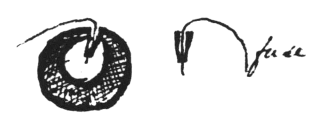To James Madison from Thomas Cooper, 18 February 1813
From Thomas Cooper
Carlisle Feb. 18 1813
Dear Sir
I write to you briefly, because you have little time for long discussions.
I understand some privateer has brought in, an english vessel laden with Congreve Rockets, shrapnall shells and other similar machines: would it not be adviseable to distribute a dozen for analysis and imitation, to a committee of two or three men of science in Boston New York and Philadelphia?1
An idea has occurred to me, which I submit.
Could not a ball be cast on the principle of a Shell, with a fuse reaching to a reservoir of powder within side, whose explosion should burst the ball to pieces, while the thickness of the surrounding shell should suffice to pierce the hull of a vessel?
Suppose for instance a ball of the size of a 24 pounder, cast with a hollow in the middle to hold a ℔ of powder, with a string-fuse reaching on the outside and communicating within side so that it should take a minute for instance to explode—the fuse wd. be fired by the powder of the Canon discharging it.

The white, a hollow to contain powder: the fuse, a string dipt in a solution of Saltpetre, or rubbed with gunpowder, or a solution of nitrate of lead as used in france. The string hanging out, would be no impediment to loading, or to the discharge of the ball. I do not know how much powder wd. be required to burst a shell of cast iron of a given thickness, but if a ball cd. be cast with a hollow sufficient to hold powder equal to the purpose, and the iron strong enough to pass through, or lodge in, the sides of a vessel, it wd. be a very destructive instrument.
Thomas Cooper2
RC (DLC). Docketed by JM.
1. The Philadelphia Aurora General Advertiser of 8 Feb. 1813 reported that the Lady Johnston, a British transport destined for Halifax from England, had been brought into the Delaware by a French privateer. In addition to the artillery officers on board, the ship carried “implements of war and military stores.”
2. Thomas Cooper (1759–1839) was born in Westminster, England, studied at Oxford, London, and Manchester, and settled in the United States in 1794. A political radical and pamphleteer who was convicted under the Sedition Act of 1798, Cooper became a member of the American Philosophical Society in 1802. He practiced law in Northumberland, Pennsylvania, served as Luzerne County commissioner from 1801 to 1804, and sat as a state judge from 1804 to 1811, in which position he wrote the opinion on a British vice-admiralty court decision that brought him to JM’s attention in 1810. Removed from office in 1811 on charges that he believed were motivated by political and personal enmity, Cooper became professor of chemistry at Dickinson College, 1811–15, where he instructed Robert Lewis Madison, JM’s nephew. He edited The Emporium of Arts and Sciences, 1813–14, and taught applied chemistry and mineralogy at the University of Pennsylvania, 1816–19. After objection to Cooper’s controversial religious views thwarted Thomas Jefferson’s attempts to hire him at the University of Virginia, Cooper served as professor of chemistry and eventually as president of South Carolina College, 1820–34 (Van Horne, Papers of Benjamin Henry Latrobe, 3:508 n. 1; , 2:388, 389 n. 1; Malone, Public Life of Thomas Cooper, 198–201, 234–42; Robert Lewis Madison to JM, 29 Oct. 1813 [NN]).

![University of Virginia Press [link will open in a new window] University of Virginia Press](/lib/media/rotunda-white-on-blue.png)
